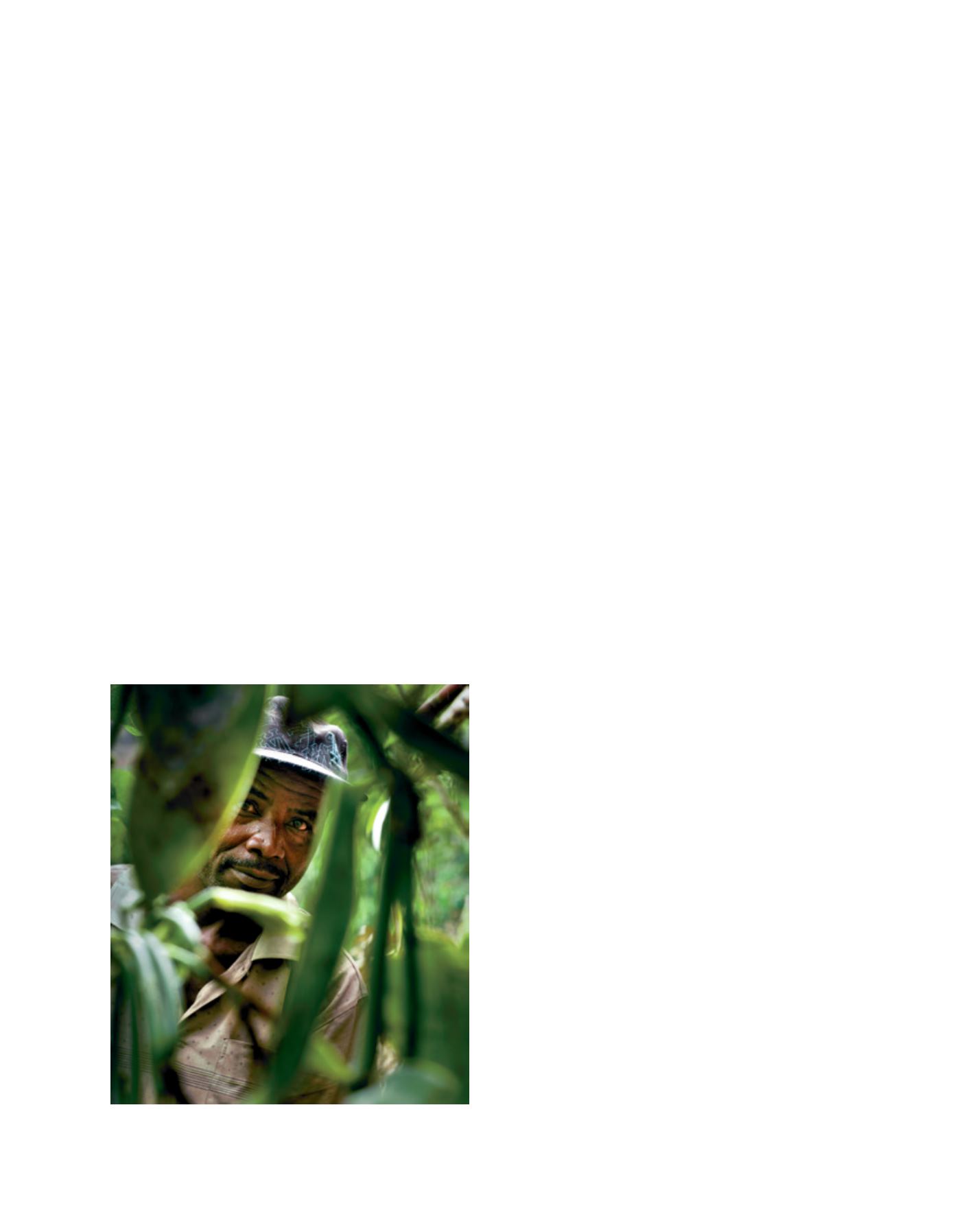

[
] 234
great challenges to get enough of the right food. Moreover,
although its vanilla is highly sought after over the world,
the majority of the 80,000 small-scale farmers who produce
the vanilla experience food insecurity, as they do not earn
sufficient income to adequately provide food for themselves
and their families. About 75 per cent of the small farmers
in Madagascar’s Sambava, Antalaha, Vohemar and Andapa
region – the majority of whom are vanilla farmers – live
on less than US$1 a day.
Vanilla is chiefly suitable for smallholder farmers and
family farmers. The average vanilla farmer owns 1 hectare
of land and uses traditional farming methods. The main
concerns that cause their income insecurity, and hence
their food insecurity, are fluctuating prices and margins.
The farmers therefore have very little power to advocate
a fair price and are cornered into a vulnerable position,
as a result of which their income is often insufficient and
unstable all year round. This weak bargaining power is due
to the fact that the pricing system is too complex for the
farmers to understand, and is largely unfair and not trans-
parent. As such, other players in the world market value
chain have the opportunity to benefit from their stronger
bargaining power, resulting in relatively higher prices and
margins for them.
Other issues affecting vanilla farmers include:
• Lack of resources – the farmers lack access to
information, technology and the financial resources
to build up savings and invest in insurance against
unexpected externalities.
• Poor quality product – desperate to sell their vanilla
to make ends meet, the farmers harvest their vanilla
too early or cure it too quickly, thus resulting in poor-
quality product.
• Theft – vanilla theft is quite high and is a huge issue
for these small farmers. Most farmers tend to harvest
their crops too early to avoid theft and therefore risk
producing poor-quality vanilla.
Recent research indicates that a handful of food and bever-
age multinationals and flavour houses are the most powerful
stakeholders in the Madagascar vanilla value chain. These
companies can and should help farmers to break out of the
cycle of poverty by ensuring that these smallholder farmers
are paid a fair price for their vanilla. A fair price covers,
among other things, a living wage for farmers, any other
labour either from family members or hired labourers, plus
all costs and risks involved in the production. Earning a fair
price will give farmers an opportunity to break out of the
poverty cycle and take better care of their families, invest in
insurance to recover from unexpected externalities, invest in
new and diverse crops, and have savings to fall back on. This
is the main topic companies should be focusing on in order
to ensure a fair system for these farmers and to contribute to
sustainable vanilla production.
Implementing viable sustainability standards, certifications
and corporate programmes – though not perfect – can be an
additional means to ensure progressive incomes for vanilla
farmers. In Uganda, it has been reported that organic and
fair trade certifications have helped about 1,200 producer
members of the Mubuku Vanilla Farmers Association to
improve their income situations.
We have seen that companies have made commitments
to improve livelihoods and increase yields through meas-
ures such as farmer training programmes, building schools,
providing financial assistance and health care. These projects
are supposedly impacting several thousands of farmers and
their families.
However, many of these programmes are a partial remedy
to the root cause of a lack of fair prices being paid to the
farmers. In addition to that, as there are about 80,000 small-
scale vanilla farmers in Madagascar, there is still a long way
to go. Moreover, the concrete impact this has had on the
livelihoods of the farmers is largely unknown and not well
measured. All in all, efforts from multinational brands and
flavour houses therefore need to be scaled up and improved to
show a demonstrable effect on farmers’ incomes from vanilla.
Support from African leaders and multilateral donor agen-
cies can also make a huge difference. In 2003, African leaders
adopted the Maputo Declaration,
3
promising to commit 10
per cent of their respective gross domestic product (GDP)
to agriculture and rural development. Improving agriculture
was seen as a path towards eradicating poverty and food
insecurity on the continent. Since 2003, only a handful of
African nations have reached or surpassed this target in any
given year.
4
Madagascar has not. The country has consist-
ently maintained a profile as one of Africa’s poorest nations.
Approximately 29 per cent of Madagascar’s GDP comes from
agriculture,
5
but seeing as this sector is largely dominated
by an extremely poor rural workforce that cultivates 1.3
hectares of family farms on average, and is plagued by mori-
Vanilla is the world’s most popular flavouring, but most of Madagascar’s 80,000
small-scale vanilla farmers do not earn enough to feed their families
Image: Fairfood International
D
eep
R
oots
















